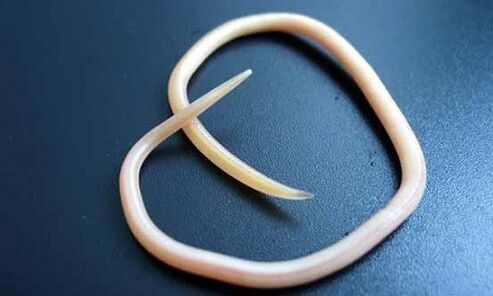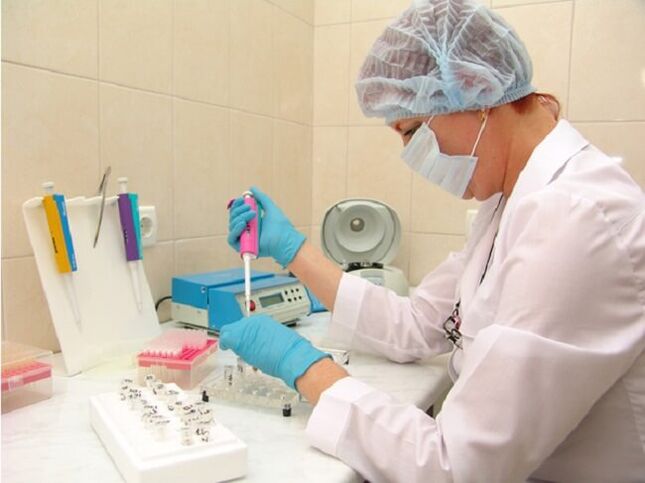
The symptoms of parasites in the body are varied. Parasites have adapted so much to the life of the human body, making it their home that one simply does not notice. However, it is also able to identify some of the other symptoms of widespread diseases during which protozoa are able to disguise themselves. These signs serve as an indirect indication that "uninvited" guests have settled.

Helminths and other microorganisms live, feed, and multiply in the human body. They live in the skin, eyes, hair and other internal organs. And only such signs of the presence of parasites, such as the constant feeling of fatigue or obesity, can be evidence that a person still has worms.
Science has reliably discovered more than 250 types of worms that can settle not only in the human gut, but also in the liver, lungs, heart, brain, and other organs of the body. The facts of medical statistics are relentless: more than 95% of the world’s population is infected with parasites. That is, virtually no person can be considered an exception. Other research has shown that 4/5 of all infections and cancers are caused by toxins released during the vital activity of parasite organisms. Every year, 15 million people around the world die from exactly one parasitic infection that eventually kills them.
Therefore, doctors advise to clean the parasites of any person who has a long history of pathological processes and for whom conventional treatment does not help.
Common symptoms of parasites in the body
However, in order not to approach the issue at all unnecessarily, it is worth knowing the symptoms of helminths:
- weakness caused by anemia that cannot be treated with medication;
- sharp exhaustion of the body, constant hunger;
- spontaneous weight gain, increased hunger, weight loss difficulties;
- migraines and pain in the head of unknown nature;
- frequent diarrhea and constipation, which are interchangeable;
- disorders of the gastrointestinal tract, the phenomenon of "nervous" stomach;
- feeling of constant difficulty on the right side of the hypochondria zone;
- joint pain (mistakenly confused with arthritis), muscle pain;
- multiple skin defects: from acne to seborrhea, neurodermatitis, psoriasis;
- decreased immunity, which results in frequent colds and infectious-viral diseases, often with signs of herpes;
- the body's allergic reactions to various substances - allergens;
- a chronic fatigue condition occurs as a result of insufficient absorption of valuable elements and vitamins A and B12 from food;
- poor ability to work, immediate fatigue, lethargy during physical and mental activity;
- sleep disorders.
Symptoms of parasites in the body include heart disease and cancer.
Taken separately, a mark does not prove the presence of helminths and other protozoa in the body. If there are more than one on their list, you must confirm the presence / absence of worms by submitting the diagnostics. And if they are still there, the body should start cleansing immediately.
Infection by parasitic organisms can be defined as follows:
- Visually assess a person’s appearance from the outside. Outside, multiple pimples, freckles, pimples, skin roughness and pallor, early facial wrinkles, blemishes, papillomas, peeling and breaking of the nail plate, corner cracks can be observed on the body. All of these diseases of the external tissues of the body are the result of infection of the stomach and intestinal tract with Trichomonas, Giardia, and other protozoa. However, there is often a "bouquet" of them.
- In enterobiasis infection (pinworm infection), external manifestations such as: growth disturbance, immaturity of the earlobes, shortened fingers (fingers shorter than the length of the palm), ring finger extending better than average, narrow forehead, sparse hairtheir loss, uneven eyes. After examining his own tongue and seeing a white coating on it, which is none other than the Candida fungi, he may find that the latter line the intestinal wall, the esophagus, and the mucous membranes of the gastrointestinal tract. The case where the plaque is removed from the tongue when brushing your teeth does not bring any results, so it is better to leave these unsuccessful attempts.
- Analyze the performance of the entire organization and identify the pathogenic factors within it. Symptoms of damage to the female body include pain and inflammation in the ovaries, prolonged periods of severe pain and general weakness, failures (or shifts) in the timing of the menstrual cycle. Subsequently, fibroma, myoma, cystic-fibrous mastopathy, inflammatory processes in the bladder, adrenal glands and kidneys alternate.
Manifestations of the presence of parasitic infections in men: prostatitis and impotence, followed by adenoma, stones and sand in the kidneys and bladder, cystitis. Mental disorders are possible due to the infection.
Diagnosis of parasites in the body

However, a person's body can be inhabited by up to tens of microorganisms of one species. Modern medicine has a number of methods for detecting the presence of protozoa in the human body.
- At the outpatient clinic, the presence is most often detected by analyzing the feces on the eggs of the worms. But the possibilities for this diagnosis are very low in terms of effectiveness, as it shows results in only 15-17% of cases. Perform other methods to diagnose helminth samples.
- Histological coprogram. This involves studying the thin section of the stool through the most powerful microscopes made with special techniques. This clearly detects the particles in the body of the parasites, with the larvae of their eggs. It allows you to give an opinion on the type of worms found and select the appropriate treatment option.
- An immunological (serological) test makes it possible to determine the presence of antibodies and antigens against worms in the human body as a result of a blood test. Diagnosis shows great effect only in the later stages of carrying the parasitic infection. Its results are reliable in only 60% of cases.
- Hemoscanning. It represents the study of the structure of the blood by scanning a "living" drop of blood that is magnified about 2, 000 times. This method can be used to assess the condition of blood cells, bacterial and fungal flora, and the presence of worm larvae.
- Electroacupuncture method. This method has received little study in classical medicine. The test is performed with special electrical devices and their electrical effects on the body.
Options for treating infections and cleansing the body

Traditionally, all anthelmintics are divided into several groups: chemicals, herbs, and homeopathic remedies. Separately for each type of treatment.
- Chemical drugs. They are very effective and give fast results within a month or two. But their toxic effects can be observed not only on worms but also on the human body. Among other things, the parasites have learned to adapt to the chemicals, so the effect may not be as expected. The destructive effect of a single-name drug is only calculated against one or two types of parasites. Chemical tablets cause a number of complications and side effects.
- Herbal medicines. Herbal collections or extracts thereof. Thanks to these, high concentrations of plant toxins that are poorly tolerated by worms can be achieved in the body. Therefore, the latter are forced to leave their "home" - the human body. The protective properties of the immune system can also be strengthened by means of herbal preparations. Human safety is guaranteed from them, while parasites have a very poor ability to adapt to them. Treatment with protozoan herbal medicines can take up to a month or even a year.
- Homeopathic preparations. The minimum period of treatment with homeopathic medicines increases to three months. The maximum duration of treatment is one year. Efficacy is determined by the doctor's qualifications and the ability to choose the right remedy. Even minor errors in the treatment regimen can yield zero results.
A folk method to get rid of parasitic infections
The main way to treat parasites by folk methods is to use bitter and antimicrobial herbs.
These include, in particular, the roots of tansy, wormwood, celandine, and elecampane.
The first stage of treatment is the use of herbal medicines with bitterness, which create unsuitable living conditions for the simplest. Antiparasitic drugs from such plants can be used for a long time without damaging the body.
The next stage is plant-derived immunomodulators and vitamin rebalancing agents with trace elements that normalize gastrointestinal function and strengthen the immune system.
There are enough recipes among people for worms.
A doctor should be consulted before treating them.
Because some herbs can cause the body to poison.






































